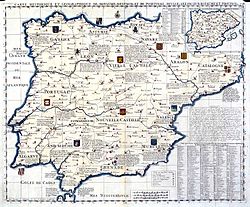
The Canary Islands, also known informally as the Canaries, are a Spanish region, autonomous community and archipelago in the Atlantic Ocean. At their closest point to the African mainland, they are 100 kilometres west of Morocco. They are the southernmost of the autonomous communities of Spain. The islands have a population of 2.2 million people and are the most populous special territory of the European Union.

The Province of Las Palmas is a province of Spain, consisting of the eastern part of the autonomous community of the Canary Islands. Las Palmas de Gran Canaria, capital city of this province and of the island of Gran Canaria, is the largest city in the Canary Islands.
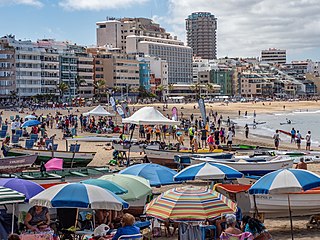
Las Palmas, officially Las Palmas de Gran Canaria, is a Spanish city and capital of Gran Canaria, in the Canary Islands, in the Atlantic Ocean.

Gran Canaria, also Grand Canary Island, is the third-largest and second-most-populous island of the Canary Islands, an archipelago off the Atlantic coast of Northwest Africa and is part of Spain. As of 2023 the island had a population of 862,893 that constitutes approximately 40% of the population of the archipelago. Las Palmas de Gran Canaria, the capital of the island, is the biggest city of the Canary Islands and the ninth of Spain.

Santa Brígida is a municipality in the northeastern part of the island of Gran Canaria in the Province of Las Palmas of the Canary Islands. Its population is 18,791 (2013), and the area is 23.81 km2. It borders Las Palmas to the west and is part of its urban area.
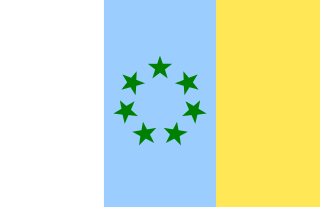
The Movement for the Self-Determination and Independence of the Canary Islands, was an independentist organization and socialist nature, founded in 1964 by Antonio Cubillo, whose objective was the secession of the Canary Islands from Spain. During the 1970s it operated through two terrorist groups: the Guanche Armed Forces (FAG) and the Canarian Armed Detachments (DAC), directly, but unintentionally causing one death, and indirectly causing 583 deaths and 61 injuries. It maintained good relations with other terrorist groups, mainly First of October Anti-Fascist Resistance Groups (GRAPO), who provided it with weapons and explosives, and with socialist Arab governments, such as Libya and Algeria, which provided financing and in Algiers they had a radio station. Also MPAIAC radio programs asked the Canarian people to "return to their roots" and tried to popularize the Berber language.

José Comas Quesada was a Canarian painter born in the Puerto de la Luz, Las Palmas de Gran Canaria. He is considered one of the greatest exponents of watercolour painting, both in the Canaries and Spain, of the last quarter of the 20th century.
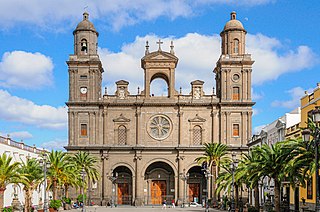
The Cathedral of Santa Ana is a Roman Catholic church located in Las Palmas, Canary Islands. The cathedral is the see of the Roman Catholic Diocese of Canarias. It is situated within the Vegueta neighborhood, next to the Plaza Mayor of Santa Ana.
The following is a timeline of the history of the city of Alicante, Spain.

The 2019 Canarian regional election was held on Sunday, 26 May 2019, to elect the 10th Parliament of the Autonomous Community of the Canary Islands. All 70 seats in the Parliament were up for election. The election was held simultaneously with regional elections in eleven other autonomous communities and local elections all throughout Spain, as well as the 2019 European Parliament election.
As in the rest of Spain, the majority religion in the Canary Islands is the Catholic Church. The Catholic religion has been the majority since the Conquest of the Canary Islands in the fifteenth century. This religion would largely replace the Canarian aboriginal religion through the prohibition of the latter and syncretism. According to a survey conducted in 2019, Canary Islands is the fifth autonomous community in Spain with the highest percentage of people who declare themselves to be Catholics after the Region of Murcia, Extremadura, Galicia, Aragon, and Castile and León. 76.7% of the population is Catholic.

Tren de Gran Canaria is a proposed railway on the island of Gran Canaria in the Canary Islands. It is planned to run from the island's capital, Las Palmas along the eastern coast of the island, serving Gran Canaria Airport and terminating in Maspalomas. First announced in 2004, construction on the line has not yet commenced due to funding difficulties.
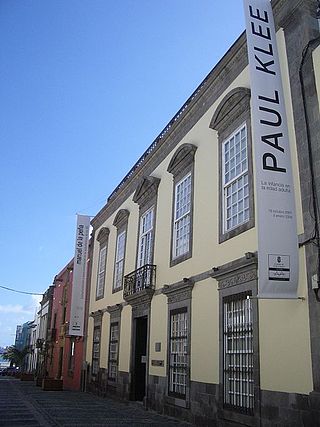
The Atlantic Center for Modern Art is a contemporary art museum in the Canary Islands, Spain. It is in Vegueta in Las Palmas, the capital city of Gran Canaria.
In the run up to the 2019 Spanish local elections, various organisations carried out opinion polling to gauge voting intention in local entities in Spain. Results of such polls for municipalities and island cabildos in the Canary Islands are displayed in this article. The date range for these opinion polls is from the previous local elections, held on 24 May 2015, to the day the next elections were held, on 26 May 2019.
La Provincia - Diario de Las Palmas is a daily newspaper of the province of Las Palmas. It is the result of the merger of the last Spanish evening paper, Diario de Las Palmas (1893), founded by Fernando de León y Castillo, and the morning paper La Provincia (1911) in January 2000. At that time both newspapers belonged to the Editorial Prensa Canaria group formed in 1978.
In the run up to the 2015 Spanish local elections, various organisations carried out opinion polling to gauge voting intention in local entities in Spain. Results of such polls for municipalities and island cabildos in the Canary Islands are displayed in this article. The date range for these opinion polls is from the previous local elections, held on 22 May 2011, to the day the next elections were held, on 24 May 2015.
The High Court of Justice of the Canary Islands is the highest organ of the judicial power in the autonomous community of Canary Islands (Spain). It has its seat in Las Palmas de Gran Canaria.
In the run up to the 2023 Spanish local elections, various organisations carry out opinion polling to gauge voting intention in local entities in Spain. Results of such polls for municipalities and island cabildos in the Canary Islands are displayed in this article. The date range for these opinion polls is from the previous local elections, held on 26 May 2019, to the day the next elections will be held, on 28 May 2023.
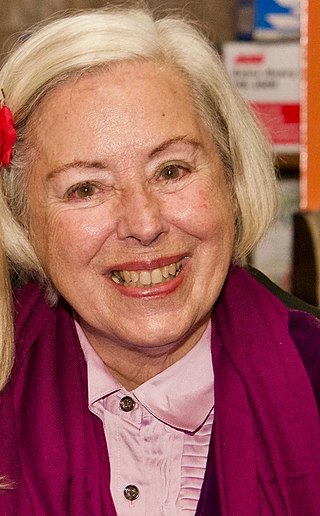
María del Carmen Reina Jiménez is a Spanish essayist, writer, activist, and politician.
